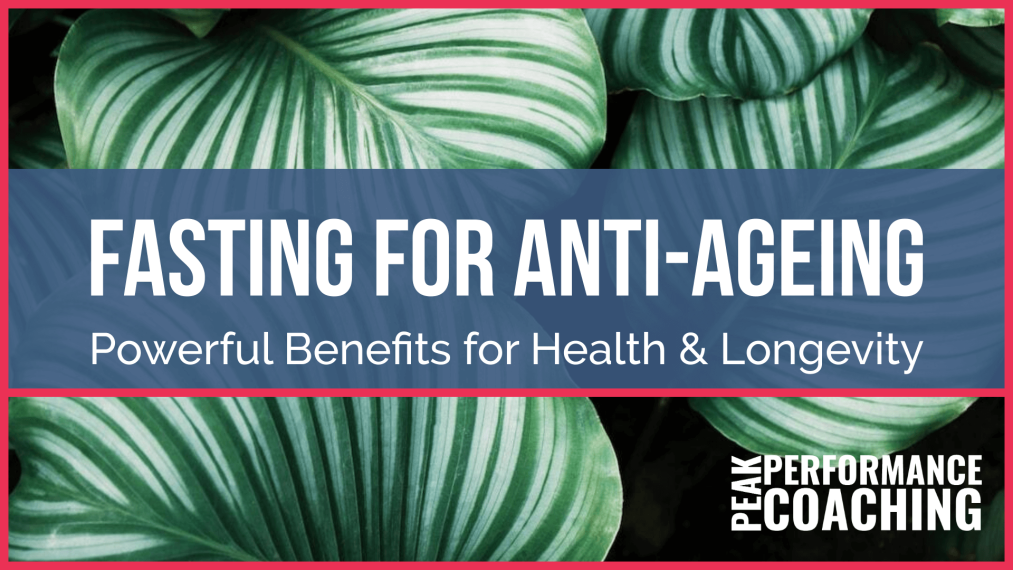
I can never say enough about the benefits of fasting for anti-ageing, health, and longevity.
As you know, in today’s Western world, our diet and lifestyle choices have led to an increase in diseases such as diabetes, obesity, coronary heart disease, hypertension, and certain forms of cancer.
However, proponents of fasting argue that it may hold the key to reversing the ageing process and improving overall health. This blog post explores the concept of fasting, its effects on the body, and how it can potentially promote longevity and vitality.
Our typical Western diet consists of three meals a day, along with snacks and sugary drinks in between. We consume excessive amounts of processed foods and fail to incorporate enough wholefoods like fresh fruits and vegetables.
When we eat a meal containing carbohydrates or protein, our blood glucose levels rise, and the pancreas releases insulin. Insulin helps convert excess glucose into glycogen, which is stored in the liver and muscles. Once these storage limits are reached, excess glucose is converted and stored as fat.
Throughout history, humans had to search or hunt for food, expending a lot of energy in the process. Hunger was a natural state, and our bodies were designed to function optimally in such conditions.
When our glycogen reserves are depleted, our bodies enter a state called ketosis, where stored fat is burned for energy. Recent research suggests that intentionally inducing ketosis through fasting can have numerous benefits, including cell regeneration and autophagy.
Autophagy is a natural process where the body degrades and eliminates dysfunctional cells. By intentionally entering a state of autophagy, our bodies can clean and repair themselves.
This process involves the destruction of older cells, followed by the creation of new, healthy cells when we consume food. Studies on mice subjected to a low-calorie diet have shown increased lifespan and reduced tumor growth.
Intermittent fasting, where one abstains from food for a certain number of hours, can help deplete glycogen reserves and initiate the use of body fat as a fuel source.
This process encourages autophagy and has a regenerative effect on various parts of the body, potentially slowing down the ageing process. By giving our bodies a break from constant digestion, we allow them to focus on repairing and rejuvenating themselves.
The best fasting approach may vary depending on individual lifestyles and schedules. Some individuals choose to eat only once a day, three or four times a week, while others gradually reduce their meal frequency.
It is essential to consume wholefoods, such as fresh vegetables and fruits, during non-fasting periods. Regular exercise, such as daily walks, should also be incorporated to enhance the benefits of fasting.
As I approach the age of 60, the desire to maintain health and vitality becomes more prominent. Fasting has provided me with increased energy levels and improved endurance, making it easier to engage in physical activities.
Combining fasting with regular exercise and a diet rich in wholefoods can contribute to a longer and more vibrant life. In conclusion, fasting has gained popularity as a means to reverse ageing and improve overall health.
By allowing the body to enter a state of ketosis and autophagy, individuals may experience various benefits, including increased longevity and vitality.
However, it is essential to approach fasting in a manageable and sustainable manner, considering individual lifestyles and preferences.
Best Foods for Intermittent Fasting: Unlock Benefits Without Hunger
Does Green Tea Break a Fast? – Shocking Truth Revealed
Does Black Coffee Break a Fast? – The Impact of Coffee on Fasting
Intermittent Fasting 20/4: Actionable Guide to Maximize Fat Burn
Intermittent Fasting Doesn’t Work Without These 4 Basic Things
3 Day Fast: A 3-Day Fast Guide to Boost Energy & Lose Weight